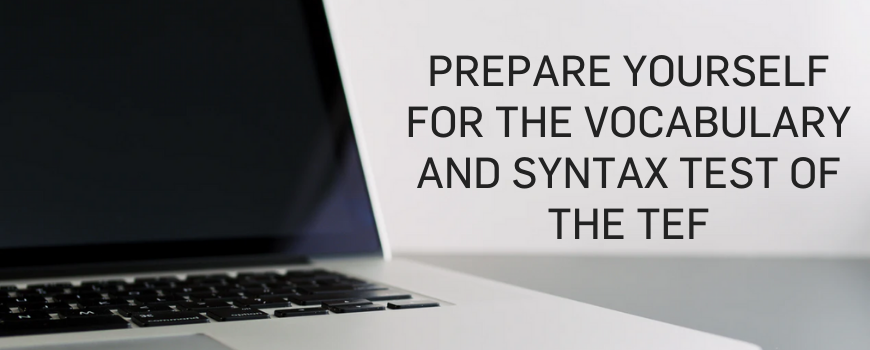
Publié le 11 December 2023
If you are taking the TEF and would like to know everything to prepare for the vocabulary and syntax part of the test, this article is for you!
The vocabulary and syntax test lasts 30 minutes and is made up of 40 questions:
• 14 questions on missing lexicon sentences
• 6 questions on texts with gaps in the lexicon
• 14 questions on syntax gap sentences
• 6 questions on texts lacking in cohesion
For each question, you will have the choice between several answer options, in the form of a list or a drop-down menu. There is only 1 correct answer. A correct answer gives you 1 point. If your answer is wrong or you don’t answer, you get no points. No points are deducted if you do not answer.
It is important to be focused and to answer all the questions. We recommend that you first read the question and all the answer options. Then, select an answer, even if you are not completely sure, and move on to the next question. You will be able to go back and change your answer afterwards. Remember to allow a few minutes at the end to reread your answers before finally validating the test.
The vocabulary and syntax test aims at measuring your ability to use the French language – vocabulary and grammatical structures – in a correct and adequate way.
To pass this test, it is necessary to regularly read all types of texts (newspaper articles, novel extracts, classified ads, etc.) on a variety of themes from everyday life. The most important thing is to do an active reading of these documents, which means :
In addition to that, don’t forget to review:
All this will allow you to reinforce your knowledge and will give you confidence on the day of the test.
Finally, to prepare yourself for the test format, you can consult the tutorial, the preparation video and some subjects examples dedicated to the oral comprehension test.
|
Some advice to pass the vocabulary and syntax test, by Jacques, education manager: 1. Manage your time so that you can answer all the questions: if you get stuck on a text or a question, note the number on the screen and move on to the next questions. You can come back to that question at the end of the test if you have time left. |
You will find this test in the TEF to integrate a school/university in France or a French school/university abroad.
You can also consult our articles on the TEF test:
–Prepare for the oral expression test of the TEF
–Prepare for section A of the TEF written expression test: the story
–Prepare for section B of the TEF written expression: the argumentation
–Prepare for the written comprehension test of the TEF
– Prepare for the oral comprehension test of the TEF
Don’t forget to consult our TEF preparation workshops here.
If you have further questions about the test preparation, email us at francais@cci-paris-idf.fr or join our Facebook group.